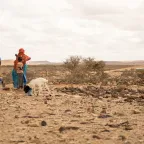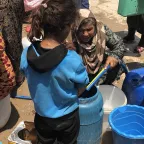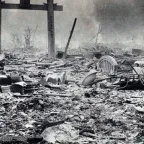Specialized Mental Health Care Annex
This document aims to complement and add to existing guidance on specialized mental health care provided by the ICRC. The document is not intended to be stand alone and should be read in conjunction …
This document aims to complement and add to existing guidance on specialized mental health care provided by the ICRC. The document is not intended to be stand alone and should be read in conjunction …
Countries affected by armed conflict are disproportionately vulnerable to climate variability and change. The daily lives of people in situations of armed conflict are made even more difficult by …
I have completed my visit to Somalia today with a heavy heart. Thirty years ago, when I first came to work in this country, I could not possibly imagine that the armed conflict, which caused so much …

04-10-2021 Jerusalem – The International Committee of the Red Cross (ICRC) is seriously concerned about the deteriorating health of Mr. Kayed Nammoura (Fasfous) and Mr. Miqdad Qawasmeh, two …
Art is a representation of life itself; it reflects the artist’s feelings, emotions and thoughts. For Basima, art has always been her passion and way of escape, but after fleeing to Jordan in 2012, …

Biometrics have become a much talked-about subject in the context of humanitarian operations. Biometric data promise to help addressing ongoing humanitarian issues such as lack of identification and …
More than ten years of conflict in Syria has resulted in widespread destruction of water facilities across the country. Access to safe drinking water is a challenge affecting millions of people …

Statement to United Nations General Assembly High-Level Meeting to Commemorate and Promote the International Day for the Total Elimination of Nuclear Weapons, 28 September 2021. Mr President of the …

30-09-2021 I’m saddened to see fighting flaring up again in Yemen, this time in Marib. The International Committee of the Red Cross is providing hospitals treating the wounded on both sides with …
How can we make biometrics work for humanitarian organizations? What programmes stand to benefit the most from their introduction? And what mitigation measures can we put in place to prevent misuse? …

Try one of the following resources:
Created in 1863, the ICRC library, alongside the ICRC archives, provides an indispensable documentary reference on the organization itself and international humanitarian law.
International humanitarian law is based on a number of treaties, in particular the Geneva Conventions of 1949 and their Additional Protocols, and a series of other instruments.
Customary international humanitarian law consists of rules that come from "a general practice accepted as law" and that exist independent of treaty law.